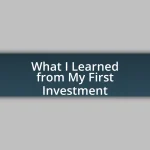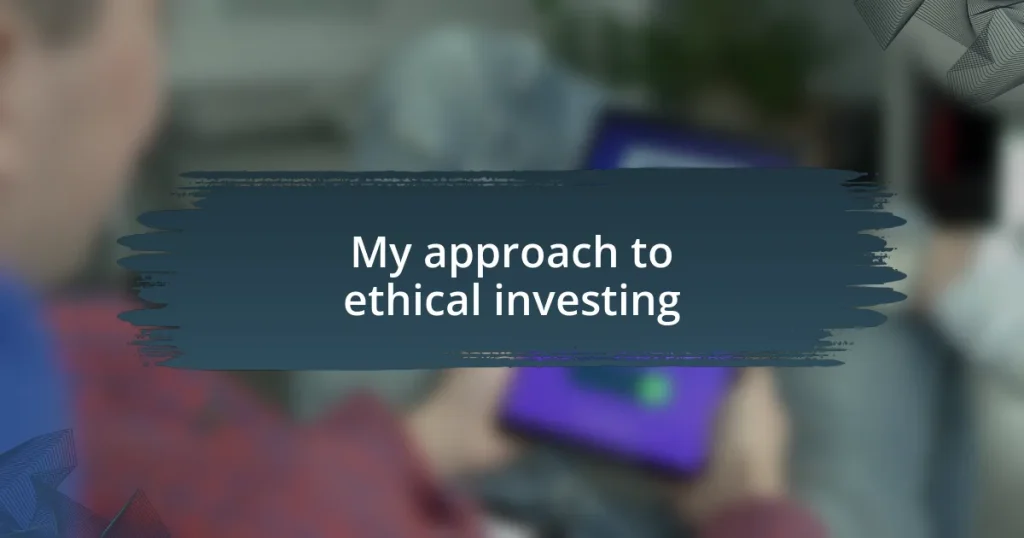Key takeaways:
- Ethical investing goes beyond financial returns; it aligns investments with personal values and societal impact, focusing on ESG criteria.
- Due diligence is crucial; understanding a company’s actual practices is more important than their marketing claims.
- Consistent research and networking with like-minded investors enhance the decision-making process and lead to more informed investments.
- Evaluating social and environmental impact requires a holistic view, taking both qualitative and quantitative measures into account.
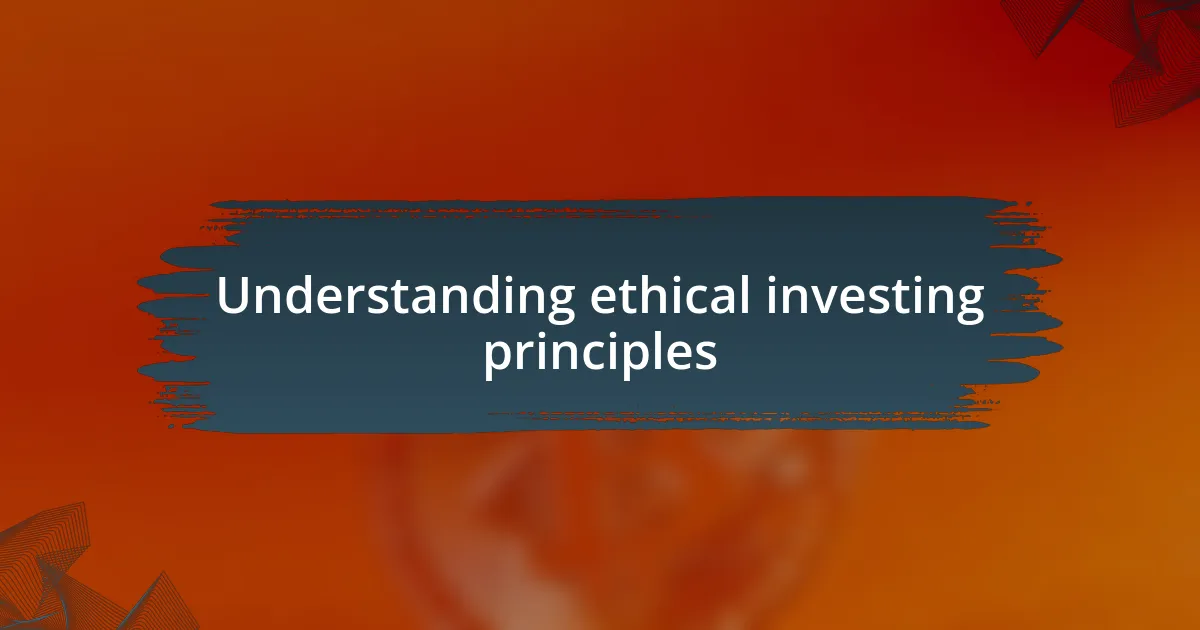
Understanding ethical investing principles
When I first delved into ethical investing, I realized it’s not just about returns; it’s about aligning your investments with your values. I often wondered, can my money truly make a difference in the world? The principles of ethical investing emphasize the importance of selecting companies that prioritize environmental sustainability, social responsibility, and good governance, or what we often refer to as ESG criteria.
One crucial aspect I’ve learned is the significance of doing your due diligence. It’s easy to get swept up in the excitement of “impact investing,” but I’ve found that looking beyond the flashy marketing is essential. For instance, I recall researching a firm that claimed to fund renewable energy projects. Upon digging deeper, I discovered they had significant investments in fossil fuels. This experience taught me the importance of understanding how a company truly operates, not just what they promote.
Additionally, I firmly believe that ethical investing goes hand in hand with personal introspection. What do you stand for? For me, it’s about fostering a future where profit doesn’t come at the expense of people or the planet. By reflecting on these principles, I feel an emotional connection to my investments, transforming them from mere financial instruments into tools for positive change.
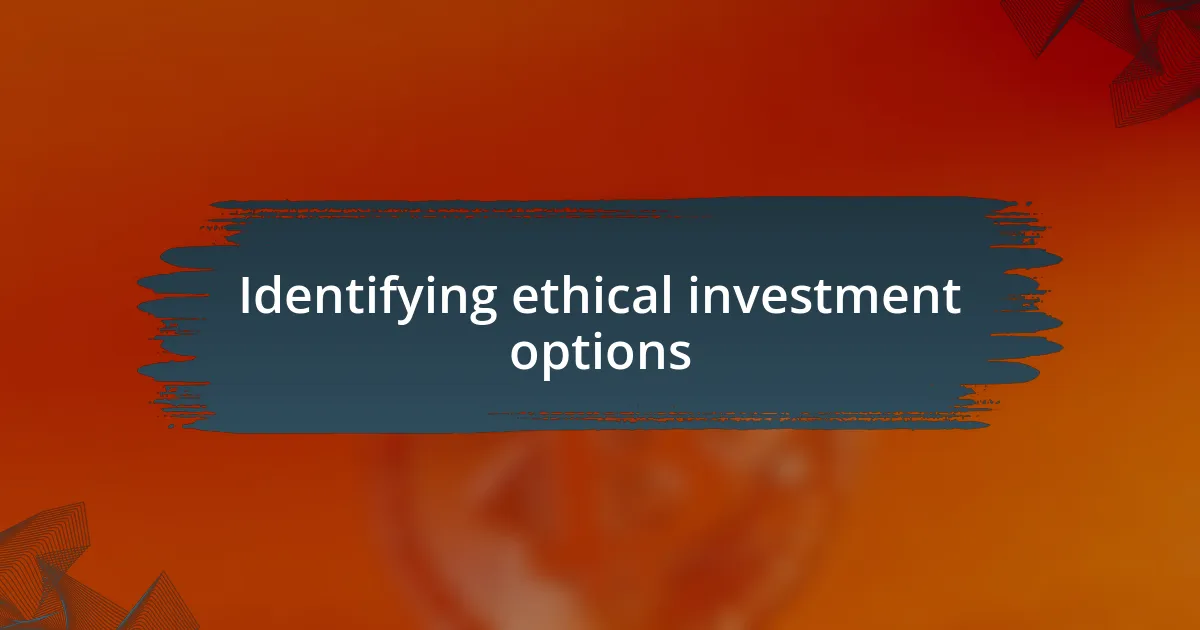
Identifying ethical investment options
When I started identifying ethical investment options, I quickly realized that it involves more than just checking a box. It requires understanding what truly makes a company ethical. For instance, I personally looked at a tech company that advertised its commitment to diversity. Initially impressed, I later found through deeper research that their executive team was predominantly homogenous. This discrepancy highlighted the importance of scrutinizing the actual practices behind the marketing claims.
Exploring ethical investments means looking for companies that demonstrate real impact. A personal experience that stands out to me was my choice to invest in a local organic farm. It wasn’t just about supporting my community; it aligned perfectly with my values on health and sustainability. It felt fulfilling to know that my money was contributing to a cause I believe in, which is something I think every investor should aim for.
As I continue to explore and invest ethically, I focus on specific criteria. I’m increasingly drawn to those with transparent reporting and third-party certifications. This process has helped me filter through myriad options, focusing on businesses dedicated to renewable energy or social equity. Investing ethically doesn’t just enhance my portfolio; it resonates with my conscience, making every dollar a vote for the kind of world I want to support.
| Criteria | Example Companies |
|---|---|
| Environmental sustainability | SolarTech Inc., EcoClean Solutions |
| Social responsibility | FairTrade Coffee Co., Community Builders |
| Good governance | Accountable Corp., Transparent Holdings |

Evaluating companies’ ethical practices
Evaluating a company’s ethical practices requires digging beneath the surface. I’ve seen firsthand how vague statements about ethics can be misleading. Take a healthcare company I once looked into: they boasted about community support but, upon investigation, were involved in several lawsuits for unethical billing practices. This experience reinforced my belief that actions often speak louder than words.
When assessing ethical practices, I consider several key areas that reveal a company’s integrity:
- Corporate culture: Are employees treated fairly and given opportunities for growth?
- Supply chain transparency: Does the company disclose its suppliers and ensure ethical labor practices?
- Environmental impact: What steps are they taking to minimize their carbon footprint?
- Community engagement: How are they contributing to local communities beyond profit?
- Stakeholder accountability: Are they prioritizing shareholders over other stakeholders, like employees and customers?
By focusing on these aspects, I feel more confident making informed investment decisions.
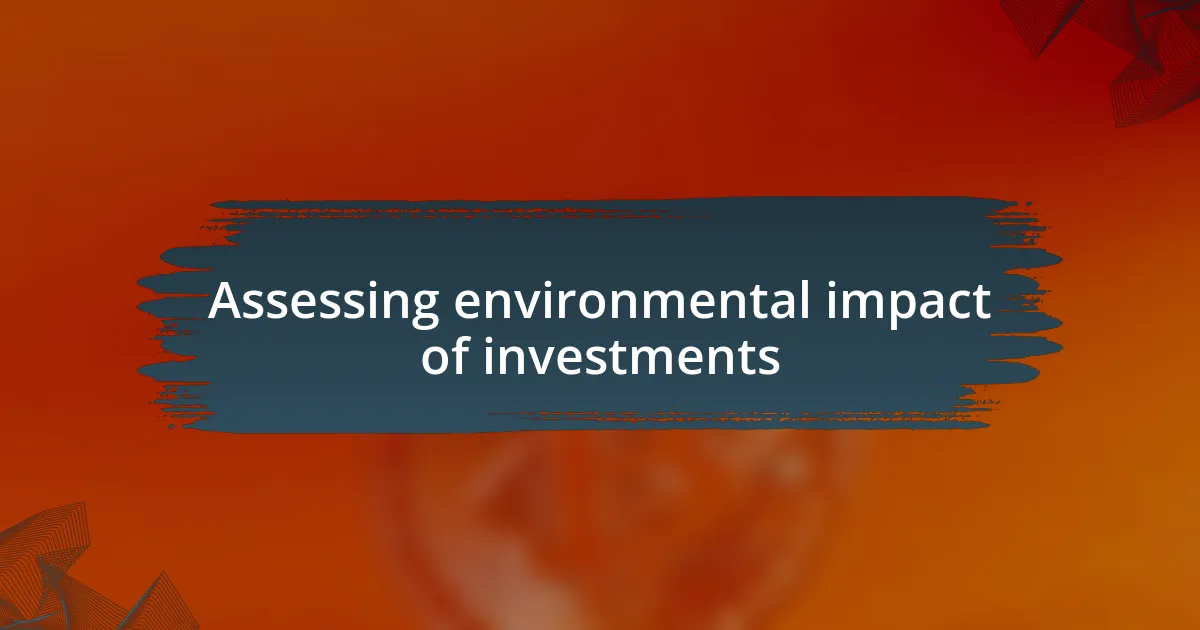
Assessing environmental impact of investments
When I evaluate the environmental impact of my potential investments, I often reflect on the concept of sustainability. For instance, I once researched a company known for its eco-friendly initiatives. They had impressive marketing material highlighting their green technologies, but I dug deeper and discovered they were also responsible for significant pollution in their production processes. This dissonance made me realize how important it is to go beyond the surface and seek hard data on a company’s actual environmental practices.
I like to think of environmental impact assessments as a balancing act. On one side are the positive claims—like renewable energy usage and waste-reduction goals—and on the other side are the undeniable facts, such as emissions data and resource usage. I remember a time when I was particularly torn about investing in a promising tech startup. They were innovating in the renewable energy space but had troubling critiques regarding their sourcing of materials, which raised red flags for me. This experience really solidified my approach: I want to invest in companies that genuinely align their operations with ethical and sustainable standards.
Monitoring a company’s progress over time is also crucial. I often check for third-party assessments or certifications to hold companies accountable for their environmental promises. I’ve found that transparency serves as a strong indicator of authenticity. Have you ever wondered how many companies genuinely follow through on their commitments? The reality is, those that are willing to share their data tend to be the ones making a real impact. This way, I can ensure that my investments not only yield financial returns but also contribute positively to the world.
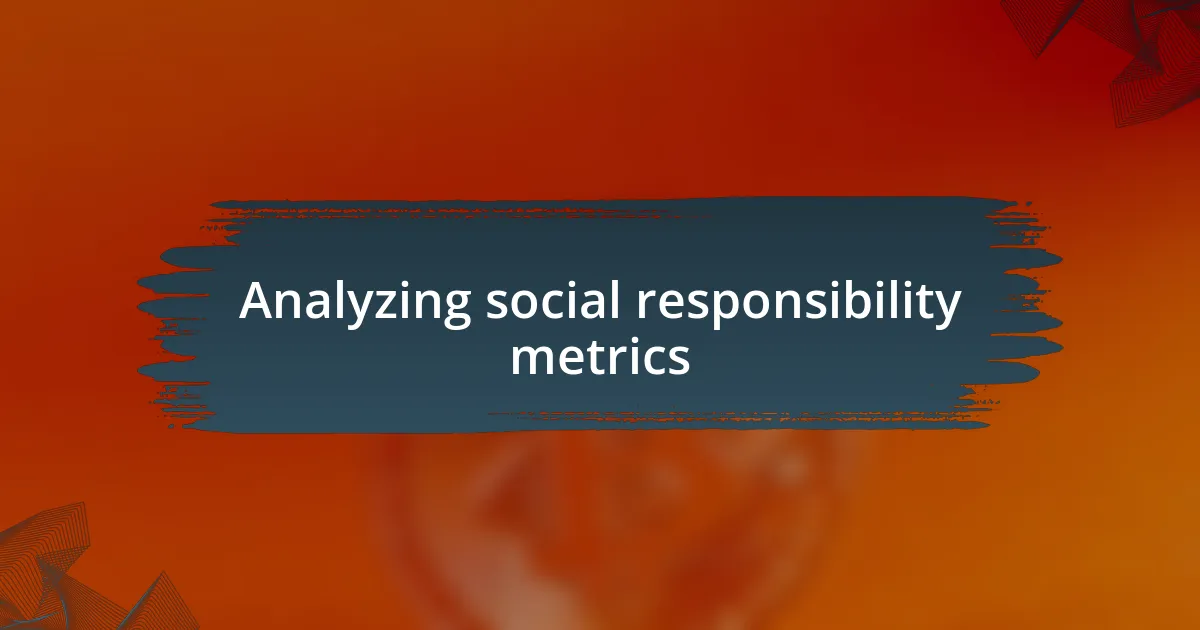
Analyzing social responsibility metrics
When analyzing social responsibility metrics, I often look for key performance indicators that reflect a company’s commitment to ethical practices. For example, during my research on a beverage company, I noticed that their employee diversity metrics were notably strong. Yet, my heart sank when I learned that they were involved in significant community disputes regarding water usage. This contradiction taught me the importance of checking for consistency across various social metrics.
I find that qualitative assessments, like employee reviews and community feedback, can be just as crucial as quantitative data. A memorable moment for me was when I read through employee testimonials for a promising firm. While management celebrated their employee satisfaction ratings, I came across multiple accounts describing a toxic workplace culture that wasn’t reflected in the numbers. This experience prompted me to dig deeply into the human side of metrics—what do they really say about a company’s values?
Engaging with social responsibility metrics demands a keen eye and a critical mindset. I’ve often asked myself: how do we truly measure a company’s social impact? An instance that stands out was evaluating a tech giant’s charity contributions. While their donations seemed impressive, I discovered that their corporate practices often contradicted their philanthropic claims, raising questions about their genuine commitment to social responsibility. It’s moments like these that reaffirm my belief in the need for ongoing scrutiny and a holistic view when assessing potential investments.
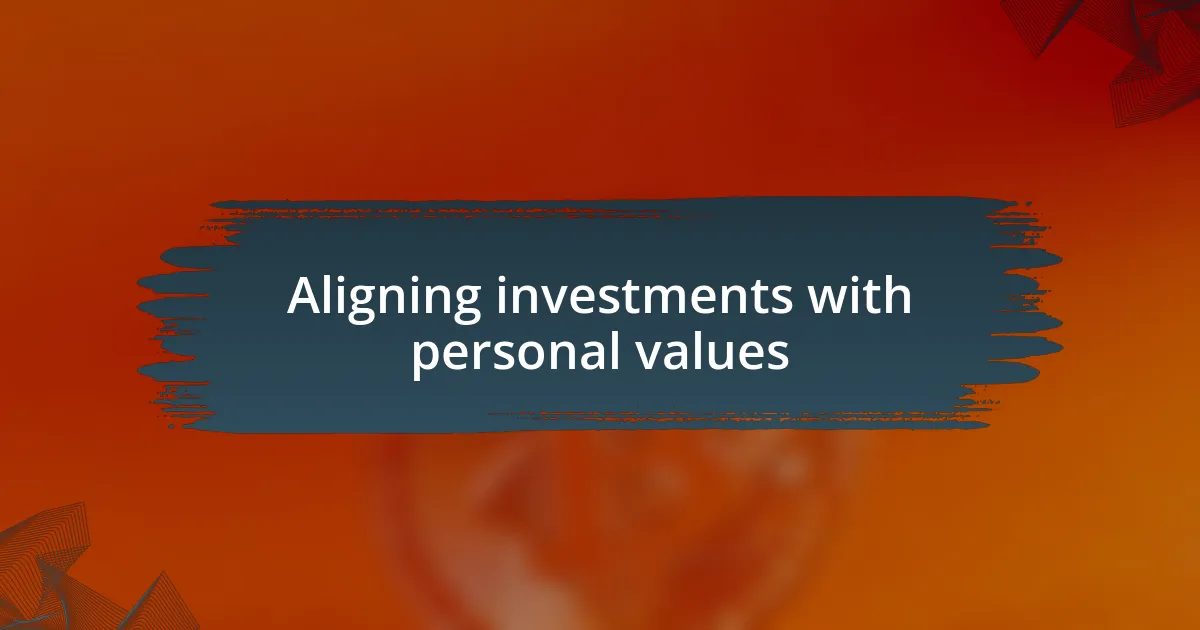
Aligning investments with personal values
When I think about aligning my investments with personal values, I realize how crucial it is to ask myself: what matters to me? A few years back, I made the choice to divest from a company that, despite strong financials, had a history of negative environmental practices. That decision was grounded not just in ethics but in a belief that investing should amplify my values, not contradict them.
I often reflect on my experience with a renewable energy firm that deeply resonated with my commitment to sustainability. Their mission felt like an extension of my own values, and I found immense satisfaction in supporting a company that actively fought against climate change. It was enlightening to see my investment not merely as a financial transaction but as a part of a larger cause. Have you ever felt that powerful connection between your values and your investment choices?
Aligning investments fosters a sense of integrity and purpose. I remember attending a conference where I met a group of investors passionate about ethical consumption. Hearing their stories about how their investments supported local communities and promoted social equity opened my eyes to the impact we can make through careful investment choices. These conversations reinforced my belief that responsible investing is more than a trend; it’s a heartfelt commitment to ensure our money speaks volumes about what we truly stand for.
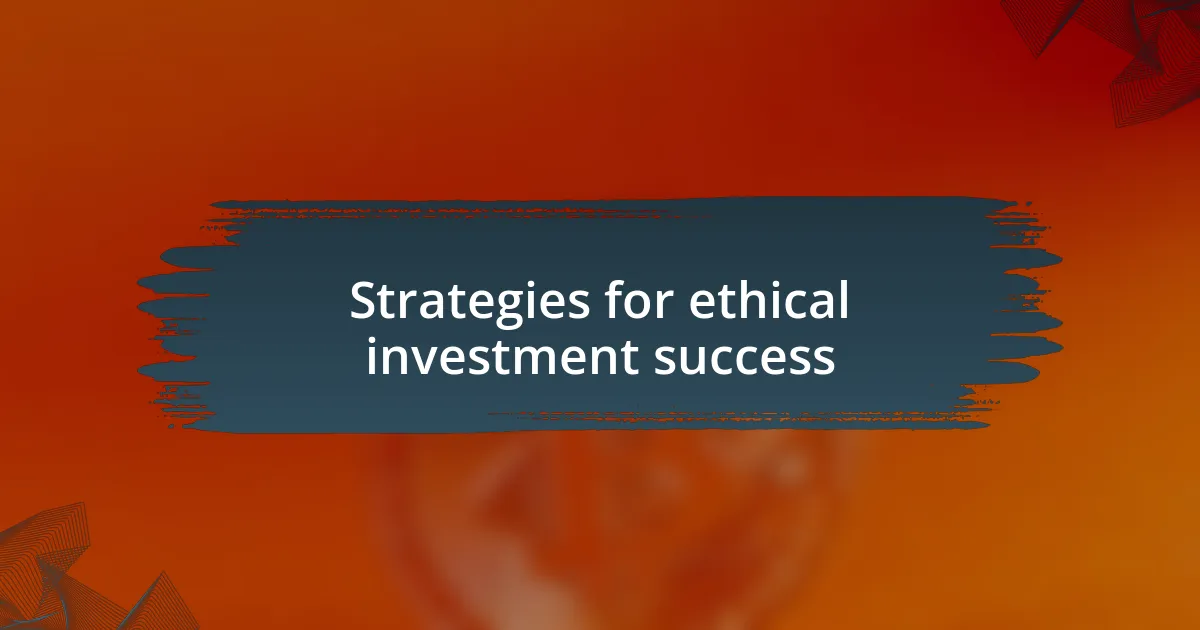
Strategies for ethical investment success
One of the most effective strategies I’ve found for ethical investment success is consistent research. I remember a time when I stumbled upon an investment opportunity that seemed promising. However, after digging deeper into its practices, I discovered troubling reports about labor issues. This experience taught me that without thorough education and awareness, even the best-looking investment could lead to misalignment with my values.
Networking with like-minded investors has also proven invaluable in my journey. I joined a local ethical investing group, and the discussions sometimes felt like a breath of fresh air. Hearing diverse perspectives on sustainable investment gave me insights I had never considered before. It made me wonder—how often do we limit ourselves by not seeking out others who share our goals?
Incorporating a balance of risk and reward is another essential part of my strategy. When I invested in a green technology startup, I felt a mix of excitement and apprehension. Although the path to profitability was uncertain, the potential impact on the environment was worth the gamble. This taught me that sometimes, making a positive impact requires stepping outside of conventional safety zones. What do you think—is the potential for a better future worth the risk?





